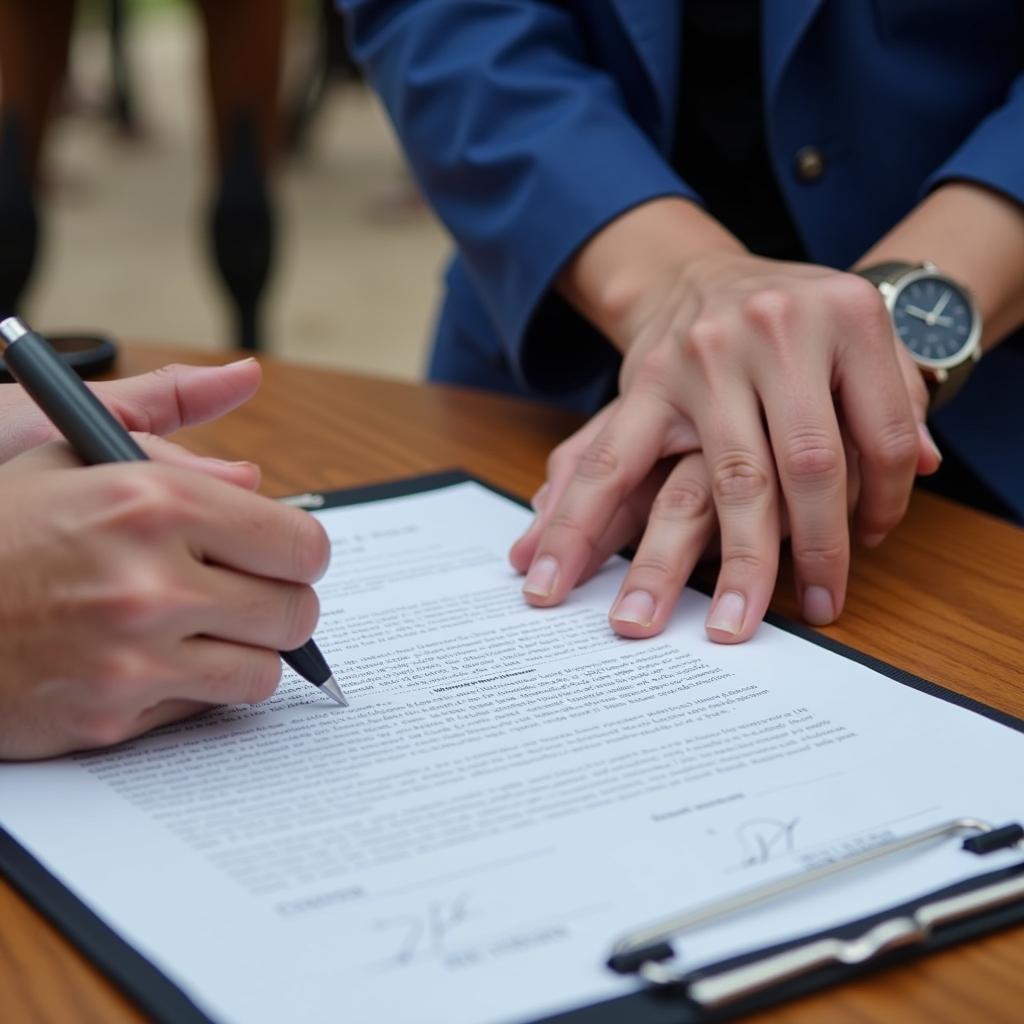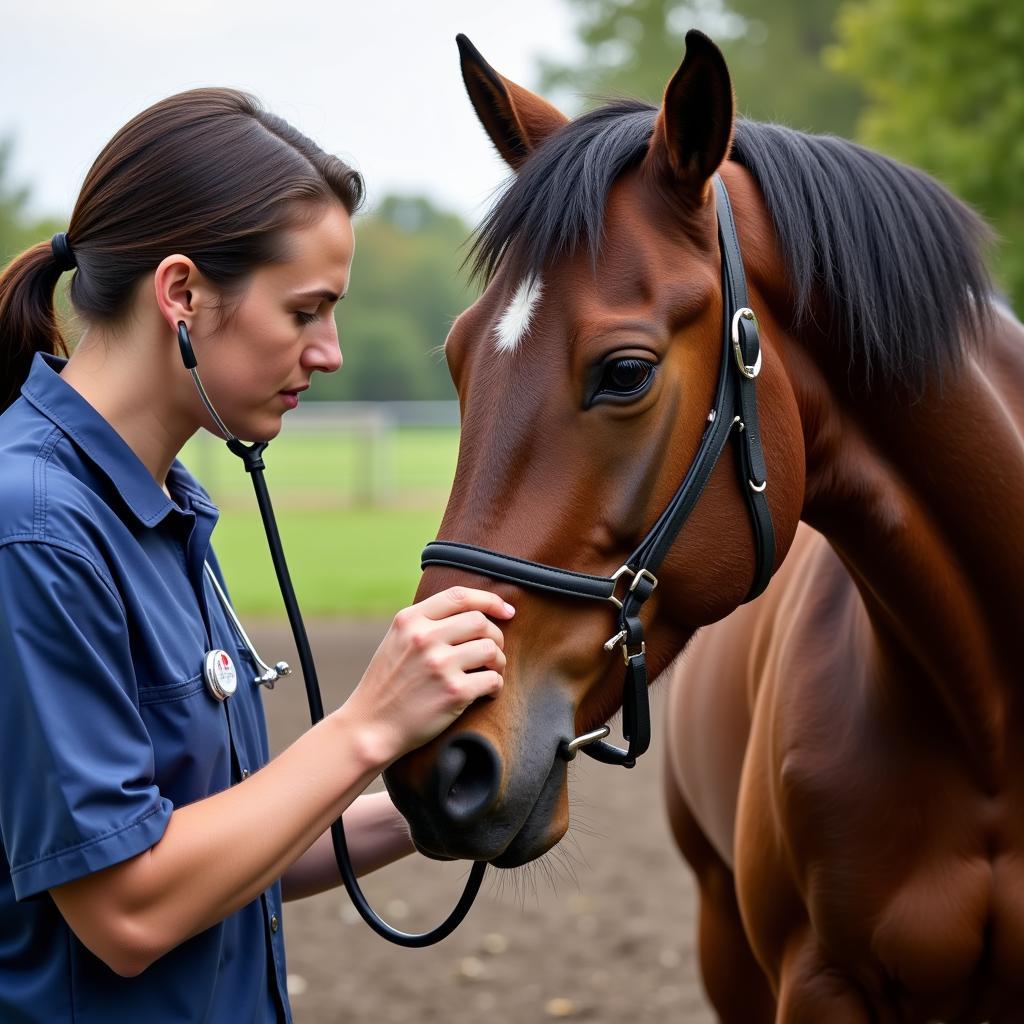Purchasing a horse is a significant investment, and for those passionate about equestrian sports, a horse trial is an essential step before making that commitment. A Horse Trial Contract is a legally binding agreement that outlines the terms and conditions of this trial period, protecting both the buyer and seller. This article will delve into the crucial aspects of a horse trial contract, ensuring you’re well-equipped to navigate this process with confidence.
Understanding the Importance of a Horse Trial Contract
 Signing a Horse Trial Contract
Signing a Horse Trial Contract
A horse trial contract is much more than just a formality. It provides a clear framework for the trial, outlining the responsibilities of both parties and minimizing the potential for misunderstandings or disputes. For buyers, it offers the chance to assess the horse’s suitability for their intended use and riding abilities. For sellers, it ensures their valuable equine partner is handled responsibly and returned in the same condition.
Key Elements of a Comprehensive Horse Trial Contract
A well-drafted horse trial contract should encompass several vital elements, including:
1. Identification of Parties: Clearly state the full legal names and contact information of both the buyer and seller.
2. Horse Identification: Provide a detailed description of the horse, including breed, age, color, markings, registration details (if applicable), and any microchip or brand information.
3. Trial Period: Specify the exact duration of the trial period, including the start and end dates.
4. Trial Fee: State the amount of the trial fee, if any, and the terms of its refundability. Non-refundable fees are common to cover the seller’s expenses.
5. Use and Care: Define the permitted use of the horse during the trial, such as riding disciplines, training activities, and limitations. Outline the buyer’s responsibilities for the horse’s care, including feeding, stabling, and veterinary attention.
6. Risk of Loss: Clearly allocate responsibility for the horse’s well-being during the trial period. Typically, the buyer assumes responsibility for any injury or illness unless caused by the seller’s negligence.
7. Insurance: Specify insurance requirements for the buyer during the trial, protecting against potential liabilities.
8. Pre-Purchase Exam: Include a clause stating whether the buyer is required to conduct a pre-purchase veterinary examination at their own expense, a crucial step in assessing the horse’s health and soundness.
9. Purchase Option: Detail the terms of the purchase option, including the purchase price, payment terms, and any conditions that must be met for the sale to proceed.
10. Return of Horse: Specify the condition in which the horse must be returned to the seller, including any timelines and responsibilities for transportation costs.
Common Concerns and Considerations
 Veterinarian Conducting Pre-Purchase Exam
Veterinarian Conducting Pre-Purchase Exam
Navigating a horse trial contract involves addressing potential concerns. Sellers should be transparent about the horse’s history, temperament, and any known vices or health conditions. Buyers must be honest about their riding experience and intended use of the horse.
Here are some additional points to consider:
- What happens if the horse doesn’t work out for the intended use? The contract should address this scenario, outlining the process for returning the horse and any potential refund of the trial fee.
- What if the horse sustains an injury during the trial period? Clarify responsibility for veterinary expenses and the impact on the purchase option.
- Who is responsible for transporting the horse to and from the trial location? Specify these logistics and any associated costs in the contract.
Seeking Professional Guidance
Consulting with an equine attorney is highly recommended to ensure your horse trial contract is legally sound and addresses the specific circumstances of your transaction. An attorney experienced in equine law can help you draft or review a contract that protects your interests.
Conclusion
A horse trial is an invaluable opportunity to determine if a horse is the right match for you. By understanding and carefully negotiating the terms of a horse trial contract, both buyers and sellers can enter this process with confidence, fostering a positive and transparent experience.
Do you have any further questions about horse trial contracts? Contact Justus Horses USA today. Our team of experts is here to provide guidance and support throughout your equine journey.
Frequently Asked Questions
1. How long is a typical horse trial period?
Trial periods vary but typically range from a few days to a week.
2. Is it standard to pay a trial fee?
Yes, trial fees are common and often non-refundable to cover the seller’s expenses.
3. Can I use my own veterinarian for the pre-purchase exam?
It’s generally accepted for the buyer to choose their own veterinarian for the pre-purchase exam.
4. What happens if I damage the seller’s equipment during the trial?
The contract should address liability for any damage to the seller’s property during the trial period.
5. Can I modify the terms of a horse trial contract?
Yes, the contract can be modified, but any changes should be made in writing and signed by both parties.
Explore Further
- Discover exceptional horses for sale nc
- Find your perfect equine partner with our horse consignment services.
For personalized assistance, don’t hesitate to reach out to Justus Horses USA.
Phone: 0772127271
Email: [email protected]
Location: QGM2+WX2, Vị Trung, Vị Thuỷ, Hậu Giang, Việt Nam
Our dedicated team is available 24/7 to answer your questions and guide you through every step of your horse buying or selling experience.